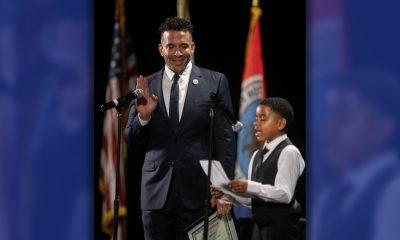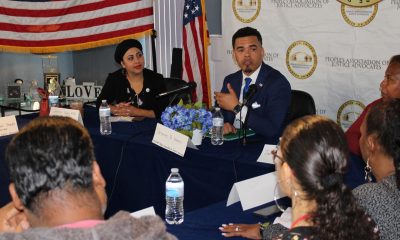Op-Ed
Child Watch: From ‘Crack Baby’ to A-Student

By Marian Wright Edelman
NNPA Columnist
The odds were stacked against Britiny Lee before she was born. Her mother was addicted to drugs, like Britiny’s grandfather and many others in their poverty-stricken Cleveland neighborhood. Britiny’s mother used drugs throughout her pregnancy and went to prison for a year just after Britiny’s birth. As a poor, Black “crack baby” with an addicted, incarcerated mother and an absent father, Britiny started life in danger.
Being born into an unstable poor family or to a single, teen, incarcerated, or absent parent are all known risk factors in America’s Cradle to Prison Pipeline® crisis. The disadvantages millions of poor children and children of color face from birth along the continuum to and through adulthood and can include no or inadequate prenatal and health care; no or little quality early childhood education and enrichment; child abuse and neglect; failing schools; grade retention, suspension, and expulsion; questionable special education placements; dropping out of school; unaddressed mental health problems; violent drug infested neighborhoods; and disproportionate involvement in the child welfare and juvenile justice systems.
Entering the child welfare system would have been still another risk factor for baby Britiny but she was lucky.
Her grandmother, who already had custody of Britiny’s older brother and sister, stepped in. She brought Britiny home, too.
Britiny says, “My grandmother stepped up to the plate to raise us because she didn’t want us to go into the foster care system.” Britiny’s grandmother didn’t have a lot of money, but she was a stable source of love and support throughout childhood and Britiny flourished in her care.
Despite doctors’ concerns when she was born as a drug-addicted child, Britiny was resilient and became a straight-A student who loved school from the beginning. Britiny’s grandmother was her rock even while struggling with the autoimmune disease lupus, which got worse as Britiny got older. When she was 8 years old, her grandmother suffered a seizure when they were home alone and Britiny had to call 911 and ride in the ambulance with her grandmother to the hospital.
From then on she was terrified of losing her grandmother. Britiny’s mother Felicia, who had come in and out of her life throughout her childhood, was struggling towards sobriety. Nine months after Felicia became sober, when Britiny was 10 years old, her grandmother died.
Felicia remembers the moving moment: “[My mother] held my hand and she told me, ‘Licia, I want to go home.’ And I thought that she meant go home, like put her in the car and take her home. No. She was saying she was tired and she was ready to go home to Glory . . . She looked at me in my eyes, and she said, ‘And God told me that you were ready, that you were ready to be a mom, that you’re going to be a good mom, that you’re not going to use drugs anymore, and that I could go.’”
Britiny’s mother was finally ready to step in, regain custody, and learn how to be the parent her daughter needed and deserved. Today, Britiny is a high school senior about to graduate from Cleveland’s John Hay School of Science and Medicine and dreams of becoming a cardiac surgeon. She recently received a Beat the Odds® scholarship from Children’s Defense Fund-Ohio.
She says of her beloved grandmother, “She’s looking down on me. I’m sure she’s proud, and right now I just want to make her even more proud. I want to show her that she didn’t fight for me for nothing.”
Britiny’s grandmother was one of the many caregivers raising children in “kinship care” or “GrandFamilies,” headed by grandparents or other relatives who step in when parents are unable to do so. Sometimes a child is removed from parents’ care by the state and placed with relatives in foster care; in other cases, children like Britiny are placed informally with relatives outside foster care. More than 6 million children are being raised in households headed by grandparents and other relatives. Of those 6 million, 2.5 million children are living in households without their parents present. These relative caregivers like Britiny’s grandmother are willing to care for the children, but often need financial or other help to appropriately meet their children’s needs.
A number of states have used subsidized guardianship programs to support kinship families and GrandFamilies. Kinship care has been found to help children maintain family, and oftentimes community, connections. There is also strong evidence that children placed in kinship care experience greater stability, have fewer behavioral problems, and are just as safe – if not safer – than children in non-relative care.
In Britiny’s case, all of these positive outcomes came to pass, and after her grandmother “stepped up to the plate,” a child who could easily have become a statistic is beating the odds and is a star with a bright future.
Marian Wright Edelman is president of the Children’s Defense Fund whose Leave No Child Behind® mission is to ensure every child a Healthy Start, a Head Start, a Fair Start, a Safe Start and a Moral Start in life and successful passage to adulthood with the help of caring families and communities. For more information go to www.childrensdefense.org.
###
Alameda County
Seth Curry Makes Impressive Debut with the Golden State Warriors
Seth looked comfortable in his new uniform, seamlessly fitting into the Warriors’ offensive and defensive system. He finished the night with an impressive 14 points, becoming one of the team’s top scorers for the game. Seth’s points came in a variety of ways – floaters, spot-up three-pointers, mid-range jumpers, and a handful of aggressive drives that kept the Oklahoma City Thunder defense on its heels.

By Y’Anad Burrell
Tuesday night was anything but ordinary for fans in San Francisco as Seth Curry made his highly anticipated debut as a new member of the Golden State Warriors. Seth didn’t disappoint, delivering a performance that not only showcased his scoring ability but also demonstrated his added value to the team.
At 35, the 12-year NBA veteran on Monday signed a contract to play with the Warriors for the rest of the season.
Seth looked comfortable in his new uniform, seamlessly fitting into the Warriors’ offensive and defensive system. He finished the night with an impressive 14 points, becoming one of the team’s top scorers for the game. Seth’s points came in a variety of ways – floaters, spot-up three-pointers, mid-range jumpers, and a handful of aggressive drives that kept the Oklahoma City Thunder defense on its heels.
One of the most memorable moments of the evening came before Seth even scored his first points. As he checked into the game, the Chase Center erupted into applause, with fans rising to their feet to give the newest Warrior a standing ovation.
The crowd’s reaction was a testament not only to Seth’s reputation as a sharpshooter but also to the excitement he brings to the Warriors. It was clear that fans quickly embraced Seth as one of their own, eager to see what he could bring to the team’s championship aspirations.
Warriors’ superstar Steph Curry – Seth’s brother – did not play due to an injury. One could only imagine what it would be like if the Curry brothers were on the court together. Magic in the making.
Seth’s debut proved to be a turning point for the Warriors. Not only did he contribute on the scoreboard, but he also brought a sense of confidence and composure to the floor.
While their loss last night, OKC 124 – GSW 112, Seth’s impact was a game-changer and there’s more yet to come. Beyond statistics, it was clear that Seth’s presence elevated the team’s performance, giving the Warriors a new force as they look to make a deep playoff run.
Activism
Essay: Intentional Self Care and Community Connections Can Improve Our Wellbeing
At the deepest and also most expansive level of reality, we are all part of the same being, our bodies made from the minerals of the earth, our spirits infused by the spiritual breath that animates the universe. Willingness to move more deeply into fear and pain is the first step toward moving into a larger consciousness. Willingness to move beyond the delusion of our separateness can show us new ways of working and living together.

By Dr. Lorraine Bonner, Special to California Black Media Partners
I went to a medical school that was steeped in the principles of classical Western medicine. However, I also learned mindfulness meditation during that time, which opened me to the multifaceted relationship between illnesses and the interconnecting environmental, mental and emotional realities that can impact an individual’s health.
Therefore, when I began to practice medicine, I also pursued training in hypnosis, relaxation techniques, meditation, and guided imagery, to bring a mind-body focus to my work in medical care and prevention.
The people I saw in my practice had a mix of problems, including high blood pressure, diabetes, and a variety of pain issues. I taught almost everyone relaxation breathing and made some general relaxation tapes. To anyone willing, I offered guided imagery.
“My work embraced an approach to wellness I call “Liberatory Health” — one that not only addresses the treatment and management of disease symptoms but also seeks to dismantle the conditions that make people sick in the first place.”
From my perspective, illness is only the outermost manifestation of our efforts to cope, often fueled by addictions such as sugar, tobacco, or alcohol, shackled by an individualistic cult belief that we have only ourselves to blame for our suffering.
At the deepest and also most expansive level of reality, we are all part of the same being, our bodies made from the minerals of the earth, our spirits infused by the spiritual breath that animates the universe. Willingness to move more deeply into fear and pain is the first step toward moving into a larger consciousness. Willingness to move beyond the delusion of our separateness can show us new ways of working and living together.
To put these ideas into practical form, I would quote the immortal Mr. Rogers: “Find the helpers.” There are already people in every community working for liberation. Some of them are running for office, others are giving food to those who need it. Some are volunteering in schools, libraries or hospitals. Some are studying liberation movements, or are working in urban or community gardens, or learning to practice restorative and transformative justice, or creating liberation art, music, dance, theater or writing. Some are mentoring high schoolers or apprenticing young people in a trade. There are many places where compassionate humans are finding other humans and working together for a better world.
A more compassionate world is possible, one in which we will all enjoy better health. Creating it will make us healthier, too.
In community, we are strong. Recognizing denial and overcoming the fragmenting effects of spiritual disorder offer us a path to liberation and true health.
Good health and well-being are the collective rights of all people!
About the Author
Dr. Lorraine Bonner is a retired physician. She is also a sculptor who works in clay, exploring issues of trust, trustworthiness and exploitation, as well as visions of a better world.
Activism
Opinion: Can Donald Trump Pole Dance?
Given all that is happening, if the presidency was more like pole dancing, you know Trump would be flat on his butt.

By Emil Guillermo
The news cycle has been buzzing the last few weeks. Xi, with Putin and Kim, the sweethearts of Trump carousing alone without him? The victims of the pedophile Epstein speaking out publicly in DC.
Then, there’s the release of that salacious letter Donald Trump allegedly wrote to Jeffrey Epstein. Trump said the letter didn’t exist. But it does.
Timing is everything.
Additionally, there are further concerns, such as the Supreme Court removing restrictions on ICE interactions. ICE Agents can stop anyone now. For any reason. And there’s the threat of the U.S. sending the military to fight crime in Chicago. Trump even posted a meme of himself as a character in “Apocalypse Now.”
All that with bad polls and bad economic numbers, and these topics are dominating the news cycle — Trump era chaos.
Given all that is happening, if the presidency was more like pole dancing, you know Trump would be flat on his butt.
The reality is the opposite. He keeps going strong like nothing’s happened. Inexplicably, Trump always seems to defy gravity.
That’s why to reassure myself with reality, I just think of Trump on a pole. Dancing. He was born on Flag Day, after all.
I’ve got pole dancing on my mind because I’m in Canada at the Vancouver Fringe Festival doing my show, “Emil Amok 69, Everything’s Flipped,” about how the current political situation gets very personal.
Get tickets here if you’re near:
I’ve performed at 16 fringe festivals, and I always look for unique performers. This year, in my same venue (the Revue Stage) I found her in a show, “The Pole Shebang.”
Andrea James Lui may look like a typical Asian American at first.
But she’s Asian Canadian, married to an Australian, who now lives down under.
At the Vancouver Fringe, she highlights her special identity.
Pole Dancer
Yes, pole dancing has come to the fringe. Leave your dollar bills at home, this is not that kind of pole dancing.
This is more Cirque Du Soleil-ish- acrobatic stuff, yet it’s hard to deny the sexiness when a woman flawlessly swings from a pole with her legs apart.
The show is more intriguing than it is titillating.
Lui has created a behind-the-scenes look at the “polar” experience.
“She could have been a physicist,” says her big sister Christina, who despite saying that, supports her sister 100 percent.
Lui touches on some of the emotional depth in the poled subculture. But there’s plenty more to mine in the future. “Polar Bare,” the Musical? I’d see it.
Trump on a Pole
So that’s how I’ve come to the polar metaphor.
As Trump flails in the news, I picture him on a pole.
The letter to Epstein is further proof of the character of the man.
Will he stay afloat?
Not if the presidency were more like pole dancing.
You can’t lie on the pole.
That’s one way all of us in the Trump era can get to the truth.
About the Author
Emil Amok is a veteran journalist, commentator, and stage monologist. He has written a weekly column on Asian Americans for more than 30 years.
Contact: www.amok.com
-

 Activism3 weeks ago
Activism3 weeks agoOakland Post: Week of November 12 – 18, 2025
-

 Activism4 weeks ago
Activism4 weeks agoOakland Post: Week of November 5 – 11, 2025
-

 Activism2 weeks ago
Activism2 weeks agoIN MEMORIAM: William ‘Bill’ Patterson, 94
-

 Activism3 weeks ago
Activism3 weeks agoHow Charles R. Drew University Navigated More Than $20 Million in Fed Cuts – Still Prioritizing Students and Community Health
-

 #NNPA BlackPress3 weeks ago
#NNPA BlackPress3 weeks agoThe Perfumed Hand of Hypocrisy: Trump Hosted Former Terror Suspect While America Condemns a Muslim Mayor
-

 Bay Area3 weeks ago
Bay Area3 weeks agoNo Justice in the Justice System
-

 #NNPA BlackPress3 weeks ago
#NNPA BlackPress3 weeks agoProtecting Pedophiles: The GOP’s Warped Crusade Against Its Own Lies
-

 #NNPA BlackPress2 weeks ago
#NNPA BlackPress2 weeks agoTrump’s Death Threat Rhetoric Sends Nation into Crisis




























































